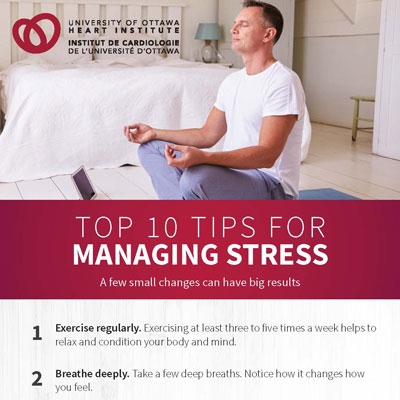According to Statistics Canada, 23% of Canadians aged 15 and older (an estimated 6.7 million people) reported most days were either ‘quite a bit’ or ‘extremely stressful’. Stress is the mind and body’s response to a perceived threat or stressor, triggering the instinct known as the fight-or-flight response. It can occur when either good or bad things happen in one’s physical environment, personal relationships, workplace or when a major life change is experienced.

Cardiac Prevention and Rehabilitation, UOHI
Although stress has a terrible reputation, it’s not always bad for you. In fact, it’s essential for survival. But exposure to too much stress for too long has a very damaging effect on the heart and one’s overall health. And if someone already has cardiovascular disease, this is not good news.
Esther Doucette, a social worker in the Division of Cardiac Prevention and Rehabilitation at the University of Ottawa Heart Institute has a kin interest in this topic. She offers a stress management class called Stress and the Heart to patients and their caregivers a few times a month. “Stress is complicated and overwhelming,” she says. “It’s impossible to completely eliminate it, but it is surely possible to manage it better.”
As part of her monthly class, Esther teaches cardiac patients effective strategies for better managing stress. She’s even developed a list of what she considers the Top 10 Tips (pdf).

“It’s a really simple tool, but it can make a difference,” explains Esther. “For example, we often have very busy lives, but making time every day for something you really enjoy is important and can help you feel better.” Esther’s pointers touch on just about everything – from exercising regularly, to nixing bad habits, to being self-aware and steering clear of unnecessary triggers. “Avoiding exposure to stress is another pretty easy tip to try,” says Esther. “You don’t have to listen to all the bad news on the media or watch that horror movie. Choose carefully what you watch and listen to.”
Esther’s list is a quick and easy reminder that a few small changes can have big results with regard to stress management. “People who have experienced cardiac events or who are living with heart disease might feel they don’t have control over a particular situation, but applying even two of these tips could help them to better cope with stress. This is quite empowering.”

